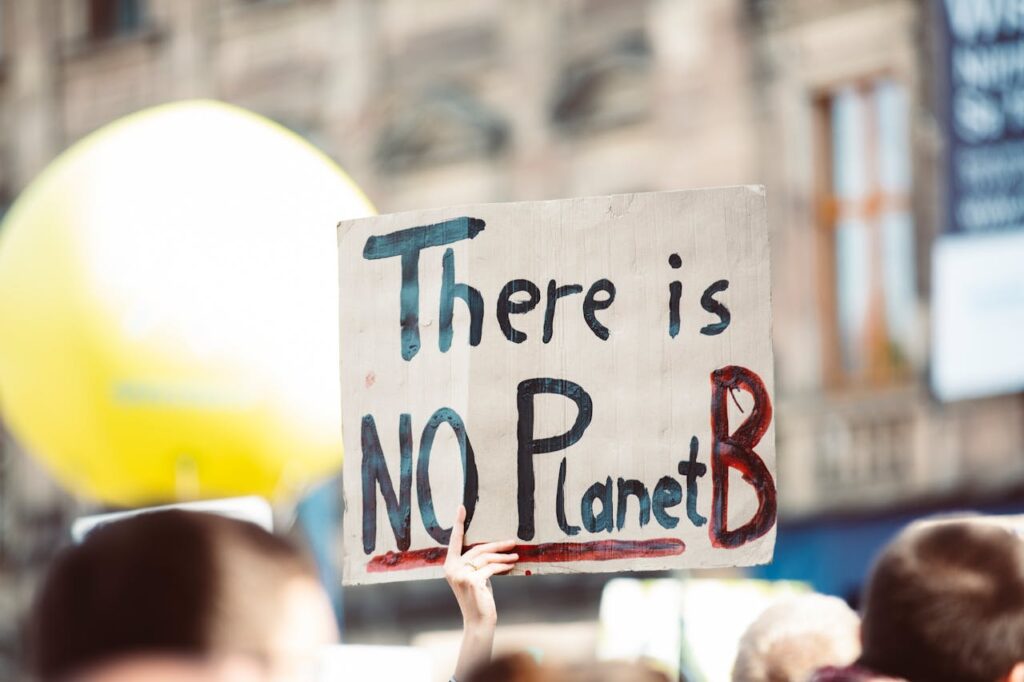This article, written by Kath Grant, was first published in the spring edition of The Pensioner.
In May 2019, Greta Thunberg and other climate action schoolchildren strikers called on older generations around the world to join them in their fight to save the planet. Thunberg said at the time: “Climate activism is not a single generation’s job. It is humanity’s job.”
Five months later, the Rev Mark Coleman, vicar of Rochdale, was arrested for his own climate change activism as he made the transition from carrying placards at demonstrations to civil resistance. Last year, the 64-year-old, now retired, was given a five-week prison sentence for sitting down in Bishopsgate in the City of London with 30 others in support of Insulate Britain.
His co-defendants were young and old and while he was in HMP Thameside, his son Harvey took over his Twitter account and passed on messages of support.
The view from his cell window was high walls and razor wire but Coleman enjoyed talks with fellow prisoners in the exercise yard when they asked him why he thought his actions were so important.
His biggest concern was that he and other defendants had not been able to tell the jury why they had chosen to break the law – because of the judge’s ruling that they could not refer to climate change.
They were all able to speak freely at their sentencing a few weeks later. And Coleman says it was moving to hear defendants’ speeches – “a microcosm of the larger intergenerational community”.
Protest groups
Coleman, who helped set up an Extinction Rebellion group in Rochdale and is joined by his wife Wendy at protests, is a member of Insulate Britain and Just Stop Oil. He was partly inspired by the words of Professor Sir David King, a former government chief scientific adviser, who said in 2021 that what was done in the following three to four years would determine the future of humanity. “In full knowledge of the science and against advice, the government is enabling new oil and gas projects,” he said. “Faced with this, we can sink into despair or denial. It’s healthier to choose to resist.”
Coleman has been joined on protests by other members of the clergy and people of other faiths. He treasures the opportunity the demonstrations have given him and others to work alongside younger people.
One mother told him she and her husband had decided to protest on the streets after their son encouraged them to read up on climate science. A friend from Christian Climate Action told Coleman she became an activist after her children had left home. And for Coleman, a diagnosis of Parkinson’s nudged him from “moving what I was comfortable with to doing what was needed”.
A YouTube video shows him reading The Magnificat outside Kingsbury Oil Terminal surrounded by younger protestors. “It is good to stand up with younger people in non-violent resistance. Older people like me are waking up, hearing the call to act, inspired by the young. It feels good to be stepping into.”
Coleman has written about his experiences as an activist and his distress that the UK and other governments are still not doing enough to rescue the planet.
He has also been interviewed by journalists, and his arrests and imprisonment have been covered by mainstream media. A story in The Sun caused much amusement among fellow prisoners when a photo of Coleman being given a drink of water by a police officer appeared alongside a piece featuring Suella Braverman criticising the police for being too “woke” with protestors.
Inspired by Greta
Greta Thunberg’s call for all generations to join the climate fightback is supported by her parents, Svante Thunberg and Malena Ernman. Their daughter’s ideas have motivated Thunberg to become vegan and Ernman to stop flying. Greta and her father famously sailed across the Atlantic for the UN Climate Action Summit to avoid the greenhouse gas emissions of commercial jet planes.
Thunberg and his wife initially supported their daughter’s campaigning because she had been bullied at school and had periods of severe depression, and they felt her activism helped. They soon realised linking up with like-minded young people was a great support.
Extinction Rebellion encourages a bridging of the generation gap with its Grandparents and Elders Group, but many older people have campaigned with protesters from other climate change action groups to influence local, regional and national policies.
There is now a co-operative network, European Grandparents for Climate Organisations, which says man-made global warming is “an ethical challenge, a question of intergenerational justice and global solidarity”. Its participants aim to exchange information, knowledge and strategies and to support climate change actions across Europe. They say they are self-organised and politically independent and connected to a range of pro-climate organisations in their own countries – stressing the urgency of acting now and initiating new projects to suit local situations and needs.
Last year’s National Pensioners Convention conference in Blackpool included a session on climate change and featured three family members talking about their concerns for the environment.
CSPA General Secretary Sally Tsoukaris, inspired by their message, sees climate action as a cause that should unite rather than divide the generations. Many young adults feel the older generations have reaped benefits they will never enjoy themselves, she says, leaving them with a climate catastrophe, housing crisis and healthcare and pension systems on the point of collapse.
But she adds: “It seems to me that older generations may not be being fairly represented. Many if not most of us share the gravest of concerns about the state of our planet and its future in the face
of climate change, especially given the fact that global leaders appear to be shrinking back from their commitments to reduce carbon emissions.
“It is not right to think we do not care about the future of our children, grandchildren and great grandchildren. I know many parents and grandparents are making big sacrifices to invest in their children’s/grandchildren’s education and housing arrangements.
I would love us to employ our shared commitment to saving the planet for future generations, to build bridges across the perceived divides.”
Older and Greener
The UK’s Centre for Ageing Better works with local authorities to promote age-friendly communities. Its Older and Greener campaign encourages older people to become more involved with activities around climate change and sees intergenerational work as an important part of the project.
The campaign points out that, when it comes to climate change, older people are among those most at risk from the effects – extreme temperatures in recent years have demonstrated this vividly. And older people are more likely to live in homes that are poorly insulated. Older and Greener’s recent report says that, despite this, older people’s views are rarely sought when it comes to attempts to solve the climate crisis.
However, people of all ages need to contribute towards the development of well-rounded policies.
“Age-friendly communities involve older people in local decision-making and can promote green transport, cycling and walking, and improve energy efficiency of homes – all of which help us to age
better,” says the report. The campaign points to examples around the country of what can be done
by communities on a smaller scale. Not everyone is ready for civil resistance, but taking part in local
projects can make a difference. And Older and Greener’s resources include an online toolkit for
climate campaigning that can be used by many different environmental action groups.
As Sally Tsoukaris points out: “Our members are reliant on decisions being made now, and in decades to come, for the maintenance of their pension schemes, state pensions, health and social care systems. So it makes absolute sense to support and work with present – and future – decision makers in every
possible way.”






